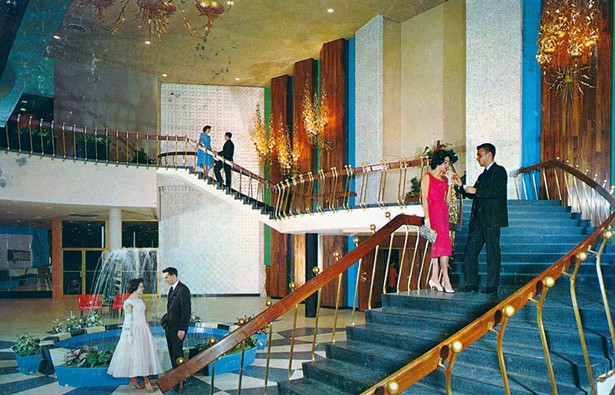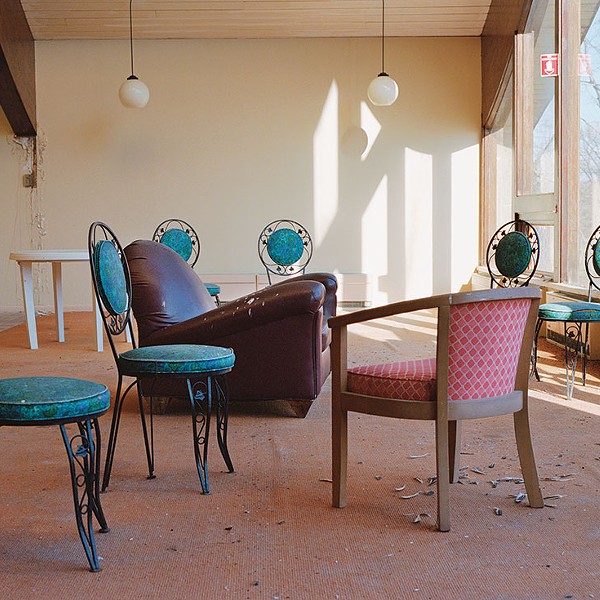Throughout the mid-20th century, the Borscht Belt was the dominant identity of the Catskills. Well over 1,000 lodging destinations made up the constellation of Jewish summering destinations, from family boarding houses and lively bungalow colonies to grand resorts like Grossinger’s and Kutsher’s, employing legions of teenagers in first jobs and offering cityfolk fresh summer air. Mothers and kids would spend summers up here, welcoming Papa for the weekend to soak up the sunshine and partake of the glam nightclub and comedy scene.
Amid the rampant antisemitism of the 1920s and 1930s, Jewish folks living in New York City and looking for a summer escape made their own epic empire of leisure. The first Borscht Belt destinations were receiving guests as early as the 1890s. The phenomenon gathered steam in the ’20s and ’30s and peaked in the 50s and 60s, before the rise of cheap air travel and greater access led to its steep decline, leaving both the region and the wider culture forever changed.
Most of the resorts themselves are but memories, but a planned Borscht Belt museum in Ellenville will showcase the quirky, wonderful phenomenon through interactive exhibits and displays that capture the era’s sights and sounds. There will also be a focus on the region's resort stages as a comedic incubator with an entertainment legacy that spawned the careers of Billy Crystal, Jerry Seinfeld, Sarah Silverman, Jon Stewart, and many more.
The museum, which had its ceremonial “groundbreaking” on April 19, will be sited in the onetime Home National Bank at 90 Canal Street, Ellenville—a building with its own connection to the glory days. “It was one of the only banks willing to loan money to Jewish hotel owners in the ’20s, ’30s, and beyond,” says museum spokesman and board co-president Andrew Jacobs. “So it really helped fuel the rise of the big hotels.”

An earlier iteration of the Borscht Belt museum proposal, which had involved a new building and a $51 million price tag, got choked up in the approval process. When that plan was finally laid aside 18 months ago, the dream that had been kicking around for over a decade began to take on manageable shape. “So now we have a building, and we’re about to replace the roof,” says Jacobs. “The space is still very raw, but after the show this summer we’ll shut it down in the fall for the interior reno and a capital campaign.”
He’s referring to the July pop-up show being organized by a group from the Bard Graduate Center’s Museum Studies program with the help of a former curator from the International Center for Photography. The show, opening July 1 and running through the fall, will be “just a taste” of what’s to come, according to Jacobs.
It’ll also be part of the first annual Borscht Belt Fest, taking place on July 28 and 29, that will fill the pretty village of Ellenville with Jewish cuisine and entertainment—including back-to-back standup comedy sets at the historic Shadowland Theater—in homage to Borscht Belt’s place in history.
It would be hard to overstate the cultural significance of the phenomenon, given that the glories of the Borscht Belt radiated as they did into the wider world. “It’s about an entire century in history without which we’d never have had Joan Rivers, to name just one,” says Jacobs. “It birthed this whole comedy genre, incisive and snippy—a lot of it might not fly today, but when you’re talking about people who are in the only place where they’re welcomed, it could be argued that they’d earned the right to get a little snippy. When you’re being persecuted, it helps if you can make light of it.”
The heritage goes beyond being what’s arguably the cradle of standup comedy; Borscht Belt resorts were also the pioneers in offering all-inclusive stays, a concept that revolutionized the middle-class American vacation. And the Borscht Belt museum plans to tell an all-inclusive tale. “It wasn’t just the Jewish community that carved out niches in the Catskills,” points out Jacobs. “There were resorts started by the Italians, the Irish, the Germans. There was the Peg Leg Bates Country Club and the Utopia Lodge welcoming African Americans, and Casa Susanna, a retreat for crossdressing men. That was all Catskills, and that’s a major theme we intend to highlight.”
Jacobs is also in talks with Joan River’s daughter, Melissa, about organizing a retrospective focused on her mother’s groundbreaking work as a woman in comedy as one of the museum’s first rotating exhibits.
The permanent collection will feature a wide variety of Borscht Belt artifacts, and even the story of their collecting has a deliciously outsider vibe. Allen Frishman, a retired plumber who served as building inspector for the town of Fallsburg in the years when the resorts were changing hands and being demolished, had an eye for resonant memorabilia. “His parents and grandparents ran a bungalow colony, and he’s very much a mountain guy,” says Jacobs. “He had to go and condemn these buildings, and he would pick up and save little bits and pieces. So his collection is at the heart of what we’re doing—it’s been a big inspiration.”
The museum is projected to open in 2025. The Board is currently raising funds to rehabilitate the historic building and replace the roof. Donations are tax-deductible and will be matched up to $75,000 by a grant from the Naiades Fund. Make a donation.
The first annual Borscht Belt Fest will take place July 28-29, buy tickets online. To learn more about the plans, and get on the mailing list for the latest, visit Borschtbeltmusum.org.





















